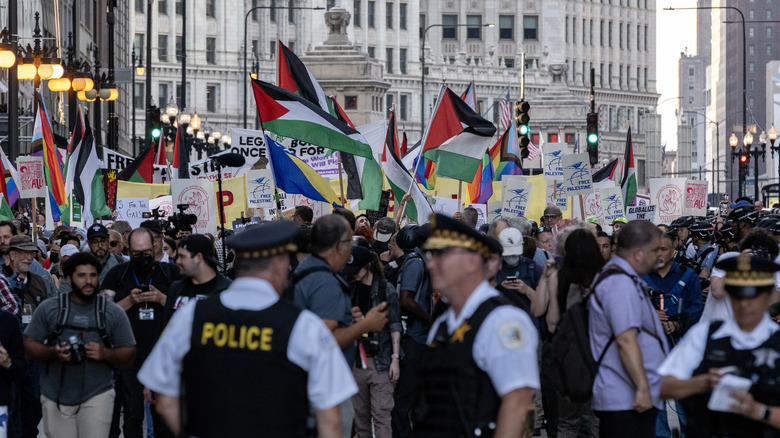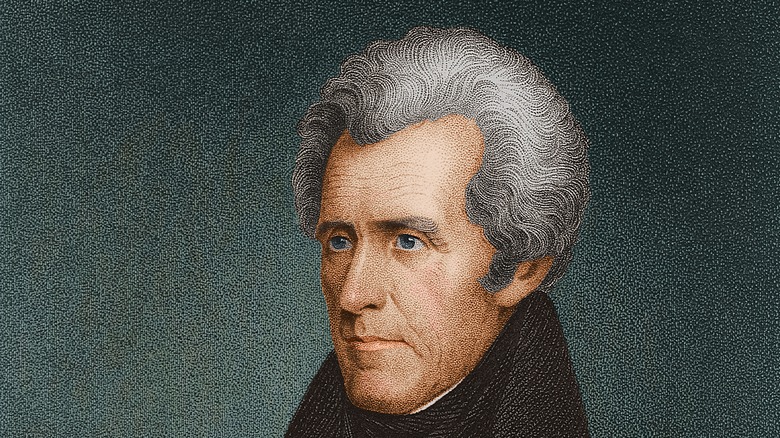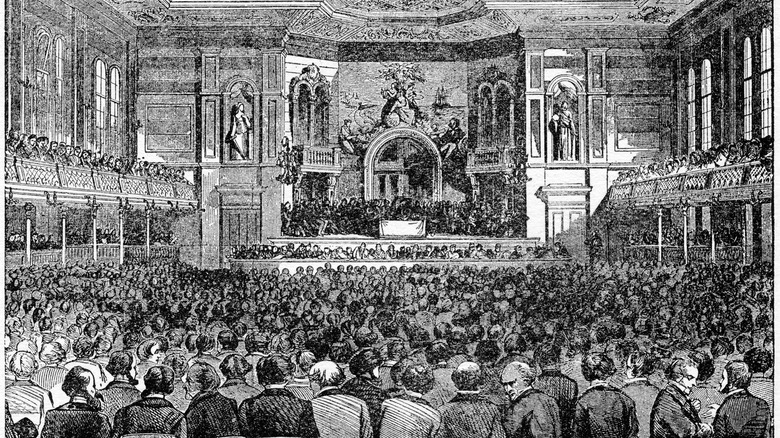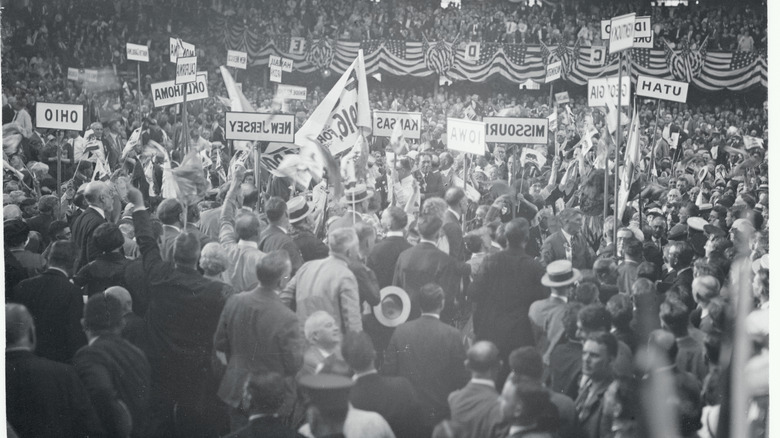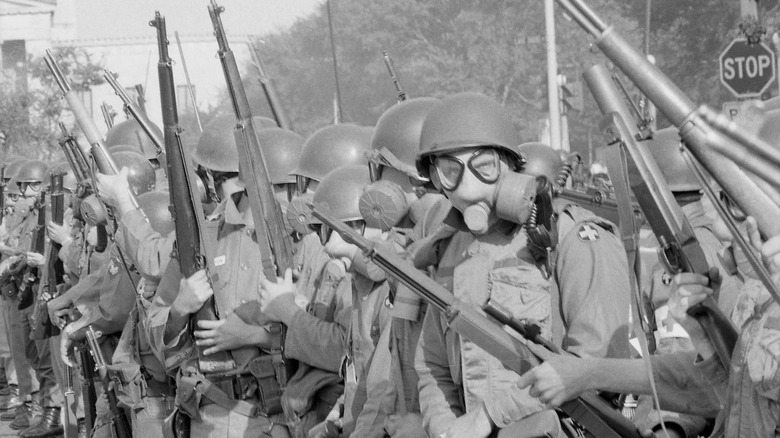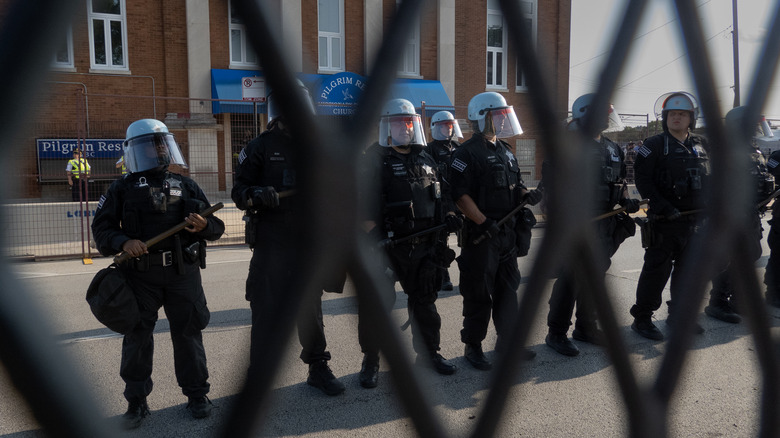The Most Controversial Moments Of The Democratic National Convention Over The Years
On the first day of the 2024 Democratic National Convention in Chicago, there were stand offs between police in riot gear and protesters against U.S. support for Israel in its ongoing war against Hamas. On the afternoon of August 19, about 100 people broke through a security gate and were met by law enforcement. While it may have had some eerie similarities to the 1968 DNC that saw a brutal police crackdown in the same city, this time there were a few arrests.
Over its long history, the Democratic National Convention hasn't always been civil, including on the convention floor. Even the first one, held in 1832, saw the presumptive vice presidential candidate unceremoniously get the boot, and it's only gotten uglier since then, especially on the eve of the Civil War. In 1860, there were two competing Democratic conventions resulting in two Democrats running for president. Then in 1924, the Democrats held the longest nominating convention in U.S. history and were nearly unable to agree on a candidate for president. Here are some of the most controversial moments of the DNC.
The first convention
The very first Democratic National Convention was held in 1832 in Baltimore, Maryland. During the event, the brand new political organization — rising from the ashes of the Democratic-Republican Party — very quickly nominated Andrew Jackson for a second term. Jackson had been president since 1829 with John C. Calhoun serving as his vice president. But Calhoun had fallen out of favor, due in large part to his support of the doctrine of nullification, a controversial political theory in which states could "nullify" any federal laws they disagreed with.
Jackson and his supporters were vehemently opposed to nullification. At the convention, the delegates instead nominated Martin Van Buren as his running mate. Calhoun ended up resigning as Jackson's vice president (the first person to do so). He became a U.S. senator for South Carolina, but his aspirations to one day be head of state were quashed. Van Buren, on the other hand, saw his political star ascend. He became the eighth U.S. president and the first to be born in the United States.
1860 DNC Southern delegates walk out
In the spring of 1860, the Democrats held their convention in Charleston, South Carolina, but things didn't go well from the start. The delegates, mostly disagreeing over the issue of slavery, were unable to nominate a candidate. Eventually, a number of Southern delegates walked out, and the convention ended without anyone being nominated. They tried again that summer, reconvening in Baltimore in June. But yet again, the Southerners walked out.
The remaining delegates nominated Stephen Douglas. Meanwhile, the Southern Democrats held their own convention in Baltimore and nominated Kentuckian John C. Breckenridge. He was at the time serving as vice president under President James Buchanan and believed slavery should be decided by the states and not the federal government. This resulted in two Democratic candidates each claiming to be the rightful nominee and one of the most chaotic presidential elections in history. In the end, Abraham Lincoln, the first candidate for the new Republican Party, won the election, which prompted the Southern states to secede from the Union, kicking off the Civil War.
1924 contested convention
In a broiling hot summer in 1924, the Democratic National Convention convened at Manhattan's Madison Square Garden in what would end up being the longest convention in U.S. history. It quickly became combative. Already by the second day, the spectators were spitting on the delegates, who angrily wrangled over candidates and issues that included Prohibition and the Ku Klux Klan. It dragged on for two weeks amid a bitter fight between New York Governor Al Smith and William G. McAdoo from California. "It is an inhuman spectacle," reporter Elmer Davis wrote in The New York Times. "If the Democratic Convention were a fight, it would long ago have been stopped by the referee."
Smith was anti-Prohibition and anti-Klan. McAdoo, while not a member of the white supremacist terrorist organization himself, had the backing of the KKK, whose reign of terror soared during the 1920s. McAdoo also wanted Prohibition to continue. Eventually, a dark horse candidate named John Davis rose to the fore as a compromise between the supporters of Smith and McAdoo. Davis lost resoundingly in the general election to Calvin Coolidge.
1968 police riots
In August 1968, the Chicago Police Department — under the autocratic mayor Richard Daley and backed by the National Guard and members of the U.S. Army — clashed with anti-Vietnam War protesters outside of the International Amphitheatre where the Democratic National Convention was being held. In what would later be called a "police riot" in an official Illinois state report, law enforcement violently attacked protestors and arrested hundreds of them.
On the other side, Tom Faragoi, a Chicago police officer, recalled having bags of human feces, bottles, and other items thrown at him by protesters. "I fractured my arm because someone threw a piece of concrete at me," he told The New York Times in August 2024. Judy Gumbo, a protester, recalled seeing police "really roughing people up, doing terrible stuff to people." Inside the convention, delegates fought over platform positions related to the war, and in some instances, the fights turned physical. In the end, Hubert Humphrey won the Democratic nomination and lost to Richard M. Nixon in the general election. And the Chicago DNC became a watershed moment in U.S. politics.
Gaza protest at the 2024 convention
In August 2024, the Democratic National Conference was back in Chicago amid protests around another war. Several thousand people were in Chicago protesting Israel's military attacks on Gaza after declaring a war that has left more than 40,000 Palestinians dead, per ABC News. Many want an immediate ceasefire agreement between Israel and Hamas and for the U.S. to stop supporting Israel.
Besides protesters breaching the outer fence surrounding the United Center where the DNC is being held, inside the convention, protesters held up a banner reading "STOP ARMING ISRAEL." When President Joe Biden appeared at the convention in support of Vice President Kamala Harris, several pro-Palestinian delegates turned their backs on him in protest. Biden, in his speech at the event, admitted that the "protesters out in the street, they have a point." "A lot of innocent people are being killed on both sides," he continued, per Axios. He also said he was continuing to push for a ceasefire. Only time will tell how closely this DNC in Chicago will resemble the one in 1968.
